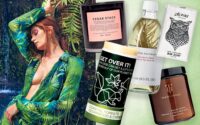Skincare supplements aren’t worth the hype, doctors say
For those itching to forego a 10-step regimen, ingestible skincare supplements are an alluring proposect.
The once-daily capsules claim to promote a healthy glow from the inside out, with ingredients such as collagen, antioxidants, probiotics and ceramide promising clear skin.
The sell of the pills hinge on emerging research about the gut-skin axis, or how the gut microbiome affects complexion.
“In dermatology, we do know that being deficient in certain minerals can cause rashes on the skin,” board-certified dermatologist Dr. Muneeb Shah, who boasts 18 million TikTok followers as the Derm Doctor, told the Post in a message.
“However, most supplements are fads and tend not to stand the test of time,” explained the New York native, who now practices in North Carolina.
Internal skincare’s popularity comes in the wake of various TikTok skincare trends — think slugging, tallow and gua sha stones.
The #internalskincare hashtag has more than 196,000 views.

Online, skincare gurus tout various vitamin and mineral supplements such as lysine, zinc, glutathione or chlorophyll, claiming they detoxified the skin, improved radiance and banished blemishes.
But there are also supplements concocted specifically with skincare — and an Instagram-perfect aesthetic — in mind.
Hum Nutrition’s Daily Cleanse supplement claims chlorella and spirulina will “help clear skin from the inside out,” while the brand’s Skin Squad Pre + Probiotic pill purports to promote a smooth complexion on its vibrant turquoise label.
Similarly, The Nue Co., with its sleek, simple branding, aims to remedy uneven skin texture and dryness with its Skin Filter capsules, using vitamin A and zinc, and Skin Hydrator formula, marketed as an “ingestible moisturizer” complete with ceramide and hyaluronic acid.


Collagen supplements, available in pill or powder form, supposedly improve skin elasticity and complexion, but have remained controversial despite their popularity, Shah said.
It’s tricky to determine which type of collagen, for example, is “best,” or which brand is “most reliable,” he added, cautioning eager health gurus to wait before joining in on the fad.
“Most trends that are truly science-based will stand the test of time,” Shah added. “Don’t be the first to hop on a trend, because if it’s worthwhile, it’ll still be around in a few years.”
Shah warned that it’s “difficult” to recommend supplements of any kind, as the claims are “largely unregulated” by the Food and Drug Administration.
Under federal regulations, the FDA is not permitted to approve most dietary supplements or their claims before they hit the shelves, leaving the manufacturers and distributors responsible for safety.
Recent studies have shown that the benefits of daily vitamins are relatively negligible, and, in fact, might even contain inaccurate dosages.


At worst, the quest for optimal health could make consumers sicker — just take it from Texan Theresa Skrobanek, who told The Post last month that supplements promising longevity just made her ill.
But at best, those once-daily capsules might just be money down the drain and into the pockets of the dietary supplement market, which was valued at an estimated $152 billion last year.
“It’s commonly joked in medical school that Americans have the most ‘expensive urine’ in the world because we take a bunch of water soluble supplements that we end up urinating out,” Shah said, noting that people tend to intake enough essential nutrients through diet alone.
In short: “Most of these products are not worth the hype.”


